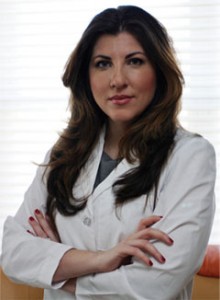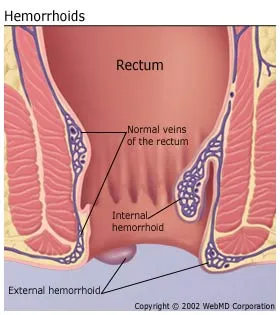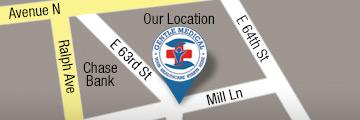What My Patients Should Know About Hemorrhoids (Piles)
Posted by admin on July 18th, 2013

“Hemorrhoids are a common problem affecting millions of people. Although they can cause pain, discomfort and bleeding, many people are reluctant to seek medical care due to embarrassment. If you suffer from hemorrhoids, you should know that various treatments are available. If you have rectal pain or bleeding, you should come in to be seen to be certain that your symptoms are actually due to hemorrhoids and not another more serious problem”.
-Dr. Zimilevich, MD
What are hemorrhoids (piles)?
Just as you can get varicose veins from standing on your feet for too long, you can get hemorrhoids from activities that place undue pressure on the veins in the rectum. When veins swell within the rectum, they are called internal hemorrhoids. When the veins around the anal opening swell, they are known as external hemorrhoids. It is possible to have both types of hemorrhoids at the same time.
What causes hemorrhoids?
Piles are most common between the ages of 20 and 50- it is estimated that approximately 40% of people suffer from piles at some point in their life, so if you have them you can consider yourself to be in good company!
Hemorrhoids can be caused by:
- weak veins- some people just naturally have weaker veins, which may predispose them to developing both piles and varicose veins
- increased abdominal pressure- pregnancy, obesity, prolonged standing or sitting, frequent coughing or vomiting, and straining during bowel movements are all activities that can increase abdominal pressure and may lead to the formation of hemorrhoids
- diet- people who eat a low fiber diet and/or a lot of processed foods may be at higher risk of developing hemorrhoids; this type of diet can cause constipation, and straining to have a bowel movement can lead to piles
- inadequate fluid intake- not drinking enough fluids can cause stool to become hard and lead to straining during bowel movements; hard stools can also irritate hemorrhoids that are already present, causing them to swell even further or bleed
- chronic diarrhea/constipation- spending a lot of time on the toilet can cause piles
- age- as we age, the tissues supporting the veins in the anus/rectum can become weak
Are there different types of hemorrhoids?
As mentioned, piles may be found internally or externally.
- internal hemorrhoids- these hemorrhoids are located inside the rectum and can’t be seen or felt. They are usually not painful because there aren’t a lot of nerves capable of transmitting pain in the rectum. Bleeding may be your only clue that you have internal hemorrhoids. Sometimes internal hemorrhoids become large enough that they protrude from the anus- these are known as prolapsed hemorrhoids. These can often be gently pushed back inside if they don’t recede on their own. When internal hemorrhoids prolapse they may be painful.
- external hemorrhoids– these hemorrhoids lie just inside the anus and may be felt when you have a bowel movement. Because the anus is innervated with nerves, these hemorrhoids can be painful, particularly if they become thrombosed. A thrombosed hemorrhoid is an external hemorrhoid with a blood clot inside it. If you have a thrombosed hemorrhoid, you will likely be aware of it as these can be very painful. The pain may cause you to seek medical attention.

What are the symptoms of hemorrhoids?
If you have hemorrhoids, you may experience:
- bleeding with bowel movements (this bleeding is painless- there may be bright red blood in the toilet bowel or on the toilet tissue)
- discomfort/pain in the rectal area
- swollen areas around the anus
- a painful lump located near the anus
- itching of the anal area
- leakage of small amounts of stool
It can be difficult to judge the amount of blood loss when blood is present in the toilet water. If you experience a change in bowel habits, pass tarry black or maroon stools or the blood is mixed within the stool, you should make an appointment to be seen immediately. Bleeding is most often caused by hemorrhoids, but it can also be caused by colon or rectal cancer or other gastrointestinal diseases. If you feel weak or dizzy and are bleeding from the rectum, you should seek care at the nearest emergency room.
What can I expect when I come in for my appointment?
If you know or suspect that you have hemorrhoids, especially if you are experiencing rectal bleeding, you should make an appointment to come in to see me. I will ask you what symptoms you have noticed, how long you have had the symptoms and what makes your symptoms better or worse. I may ask about your bowel habits (how often your bowels move), whether you have noticed a change in your bowel habits, what you typically eat and how much water or other fluids you normally drink. I will also ask if anyone in your family has ever had bowel or anal cancer. I may decide to examine you. If you have been experiencing a lot of bleeding or have been bleeding for a long time, I may decide to order blood work to ensure that you are not anemic (low in iron/red blood cells) from blood loss.
What is the treatment for hemorrhoids?
Treatment is dependent on whether your hemorrhoids are internal or external and how severe they are. Medicated ointments, creams and suppositories may be helpful to relieve discomfort, swelling and itching. You can also try warm baths for comfort. A high fiber diet and an increase in fluid intake may help to prevent constipation. If your hemorrhoids are severe, I may decide to refer you to a specialist. Surgery is sometimes necessary, but there are also minimally invasive procedures that can be performed to treat hemorrhoids.
If you are experiencing rectal bleeding, it is important to ensure that your bleeding is indeed due to hemorrhoids and not another more sinister condition. It is dangerous to assume that bleeding is due to hemorrhoids without ruling out a more serious problem. If you have hemorrhoids that are causing you discomfort or are experiencing rectal bleeding, make an appointment today.
Our Location

6301 Mill Lane, Brooklyn, NY 11234.
(718) 942-4600



